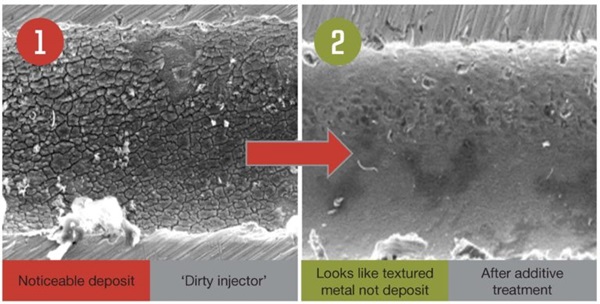When developing multi-functional additives, the most important ingredient is the deposit control additive (DCA). Here we discuss its significance.
At the core of multi-functional additives are a carefully formulated blend of ingredients which can include DCA, demulsifier, antifoam and diluent solvents, as well as anti-oxidant, lubricity improver, metal deactivator, anti-static, anti-corrosion, cetane improver and cold flow improver.
Left untreated, deposit build-up in diesel fuel injection systems can lead to a range of engine and vehicle performance issues, including reduced engine power, reduced fuel economy, increased emissions, impaired vehicle drivability and increased maintenance costs throughout the lifetime of the vehicle.
DCA are the most important ingredient in both multifunctional diesel and gasoline additives and are primarily designed to prevent and remove deposits within vehicle fueling systems, helping to minimize the performance issues highlighted above. They work by both preventing and removing deposits from metal surfaces they come into contact with.
- Deposit Prevention (or “clean up”): Here DCA work by solubilizing deposit precursors, stopping potential deposits from forming which protects the metal surfaces they might otherwise have come into contact with, notably the fuel injector.
- Deposit Removal (or “keep clean”): Where deposits have already attached onto metal surfaces, DCA adsorb to the deposit, remove it from the metal surfaces and carry it away.
To show how effective DCA can be, we can look at a test undertaken to assess their effectiveness on the fuel injector—deposits that form in the fuel injector spray channels restrict the fuel flow through the channel and reduce engine power.

Source: CEC DW10 test conducted on spray injectors without and with Lubrizol® 9040 Series DCA
The image on the left shows a sectioned spray channel where no DCA have been used. Deposit build-up can clearly be seen, which will result in reduced engine power.
In contrast, the image on the right shows an injector that has been treated with a high performance DCA. No deposits within the spray channels are evident, demonstrating the ability of DCAs to prevent deposit build-up and, in turn, prevent engine power loss.
The combined effect of “clean up” and “keep clean” means carefully formulated DCA can provide significant benefits to vehicles both old and new. In the drive for greater fuel efficiency and reduced emissions, fuel injectors have become more susceptible to a wider array of diesel deposits. The final article in this 3-part series on multi-functional fuel additives discusses the spectrum of diesel deposits and the benefits when formulating against them.
For more information on deposit control additives, contact your Lubrizol representative.









